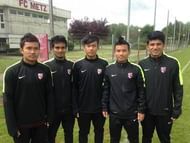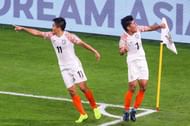Indian National Team and Chennaiyin FC midfielder Anirudh Thapa has grown into a midfield maestro in a very quick time. He is just 22, and is arguably India’s best midfielder. He plays as a central and defensive midfielder. Thapa recently penned a long term contract with Chennaiyin FC, and could potentially lead the ISL team in the near future. Thapa is pivotal to Csaba Laszlo’s plans for the ISL 2020-21 season. With quite the responsibility on his shoulders, the AIFF Academy graduate is set up for bigger things to come.
Thapa spoke exclusively to Sportskeeda about the impact of the coronavirus pandemic, his playing journey, and the role of AIFF Academy in his career. He also spoke about his playing time in the U-17 World Cups, ISL and I-League. Excerpts from Part 1 of the Interview:
The Coronavirus lockdown has suspended Indian football activities since March 2020. With over six months with no football action, players have been devoid of playing time and fitness. However, home workouts have come as a rescue for the footballers. When asked about the overall impact of the Coronavirus Pandemic on players, Anirudh Thapa said:
‘Maintaining fitness was difficult as we could not go out. I was not able to run. We were resorting to home workouts. I worked especially on my core strength. We were mostly doing the National Team home workouts assigned to us.’
The beginning of Anirudh Thapa's journey
The 22-year old midfielder started playing football from his school days in St. Joseph's in Dehradun. Thapa then moved to St. Stephen's in Chandigarh for better playing opportunities before breaking into the AIFF Elite Academy programme. Taking us down the memory lane, he said:
‘My brother used to play for our school team. I also started with the same school team. There was this coach, named Ratan Thapa. He guided us. He trained us, arranged camps for us, went to summer and winter training camps. He was the one who asked me to go to St. Stephen’s Academy in Chandigarh. He was extremely helpful and kept talking with my parents and encouraged me. That was where my playing journey kicked-off.’
After being scouted by the AIFF Elite Academy programme from the St. Stephen's Academy in Chandigarh, there has been no looking back for Anirudh Thapa. He moved from the U-14 to U-19 in the Federation's Flagship youth programme. Speaking on the importance of the Elite Academy in moulding him as player over the years. He said:
‘The school team, St. Joseph’s in Dehradun, only allowed me to play school tournaments and tournaments within Uttarakhand. The St. Stephen’s Academy in Chandigarh allowed me to play national level school tournaments but we seldom played professional football clubs. However, the AIFF Academy changed that. We got to travel and play teams from across the country. The best group of players used to be scouted by them. Since my academy batch was based in Kolkata, it allowed us to have an added advantage of playing in a football club. We played a lot of matches, not just with our age group teams, but also with the senior age group teams. The game time allowed me to build on my skills and techniques over the years.’

Thapa joined the National Team Setup in the U14 squad. He then went on to play the SAFF U-16 Championship and AFC U-16 Championship qualifiers in 2013. He also went on to represent India in the SAFF U-19 Championship. Thapa talked about the importance of playing for the youth teams of India as part of his tenure with the AIFF Elite Academy. He emphasised on the endeavours and competition at the youth level for a player:
‘Playing in the National youth team setup was extremely challenging. We had another academy in Mumbai which was for a batch, one year senior to us. It was difficult to compete with those players. It was also immensely tough to stay away from your homes for years. We saw that several better youth players who were senior to us failed to get chances as they graduated as a professional. There was a lot of buzz about the competition on the senior level. The word that it was way easier to perform in the youth than to perform as a professional. However, players like me did break into the senior teams, year after year from U14 to U23, due to the excellent coaches and academy infrastructure. The transmission from U16 to U19 was smooth.’
‘The AIFF then sent me to FC Metz (France/Ligue 1). That was one of the most crucial phases of my playing career. We had our doubts about going to Europe. One set of coaches insisted us to play in Europe while the other set of coaches advised us to stay in India. I am glad I went to Europe. The moment Chennaiyin FC came in and signed me up, I was extremely pleased. I was one of the few players who had a swift transition from India U14 to an ISL team. I am glad I was part of the AIFF Academy programme and started with the National Team Youth teams. I am glad that I am part of such a club which has allowed me to grow as a player.’
A taste of European football for Thapa
Anirudh Thapa was part of the 5-member team which went to Ligue 1 side FC Metz on a 3-month training stint. He was with Prosenjit Chakraborty, Jerry Lalrinzuala, Baoringdao Bodo and Bedashwor Singh at the French Club. Speaking on the cultural and sporting difference between Indian and European youth football, Thapa said:
‘Kids in Europe start playing football from a very young age. They get accustomed to the basics, way before than players from other continents. They have a very high intensity and temperament even in their amateur youth games. It helps them to compete with players at a higher level. When I went to Metz, the players were better than us in terms of tactical and technical awareness. The players who were part of Metz were from countries like Belgium, Spain, Luxembourg, Portugal and France. They came from a different background and culture. We got a personal perspective on how football works in a traditional European society. It was a very good learning experience for me.'

Anirudh Thapa was part of the India squad which featured in the AFC Asian Cup 2019 in the United Arab Emirates (UAE). Thapa scored in the historic 4-1 win over Thailand in the opening fixture. Thapa was elated as he spoke about his experience in playing in Asia's top international football competition:
‘It was one of the greatest things to happen to me. It is one of the most important competitions in International football and the most important event in Asian football. I scored a goal and it was special. We were happy to realise that there were fans outside India who follow and support Indian football.’
Anirudh Thapa on the future of the Indian national team
The Indian football team is in a tactical and philosophical transition phase after the departure of former Head Coach Stephen Constantine. The national team is now led by Head Coach Igor Stimac who has fundamentally, a different approach to playing the game. Thapa explained the differences between the two coaches. He said:
‘They both are good coaches and have different playing philosophies. We did great under Constantine and are in a transitional phase under Igor Stimac. One of them was a bit direct in play while the other focuses on possession-based football.’
The FIFA U-17 World Cup 2017 was a major success in terms of stadium attendance and organisation of the event. The event also allowed young footballers to perform and get scouted to top Indian football clubs. When asked about the role of the FIFA U-17 World Cup 2017 and the upcoming FIFA U-17 Women’s World Cup in 2021. He said:
‘The FIFA U-17 World Cup 2017 was a success. We can see players who were part of the World Cup squad, are slowly coming into the Indian Super League as well. It has laid a foundation for players to develop. The U-17 Women’s World Cup 2021 will also serve a similar purpose. It will give young girls, a platform to perform. Since we have an Indian Women’s League in place, I am hopeful that the girls who would perform in the World Cup will be offered contracts from the football clubs with women teams. This allows more playing team with a bigger player pool structure in women’s football.’
Part 2 of the Interview will be published soon.
